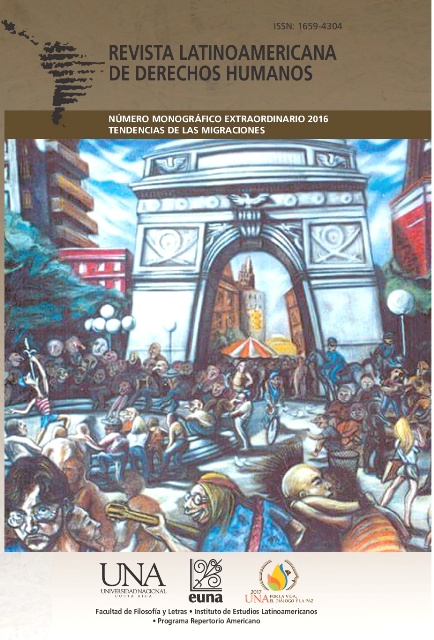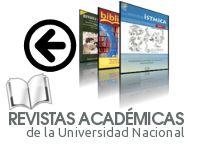Longing Itineraries: Building the Translocal Community
DOI:
https://doi.org/10.15359/rldh.extraordinario2016.9Keywords:
Migration, translocality, emotions, virtual spaces.Abstract
Migration has reshaped social practices, the sense of belonging has been rethought, and the membership is renegotiated and contended; this is why strategies for their sustainability have been generated. The translocal community operates through multilocated relationships that reveal the ways in which migrants are adapting to the new demands of the community. We emphasize the emotional impulse of nostalgia as one of the vehicles of sustainability for the community. The community is redefined and understood in a set of socio-cultural relationships its members generate, and where the locality is not central, but the connection. A new dimension of the social community space is not just the community gathered in a specific place, but also that agreements, commitments, and acknowledgments are exhibited and settled in the cyberspace; this cyberspace gives cohesion and brings a dynamic element to preserve the community, despite the fact that it is even less concrete than the spatial notion of territory. Facebook, YouTube and a blog are the web platforms of the virtual space where "neighbors, compatriots and citizens" (categories of ascription from the migration) get together, where there is a reproduction of social practices (even the most ancient and fundamental ones), to give a new dimension to a translocal, multilocated and ciberlocated community.References
Araujo, J. (2003). El concepto fiabilidad en Anthony Giddens. Colección Ensayos No. 10. Universidad Autónoma Metropolitana/Plaza y Valdés, México. Recuperado de books.google.com.mx/books?isbn=9707222042
Ayora S. (2007). Translocalidad y la antropología de los procesos globales: Saber y poder en Chiapas y Yucatán. En John Wiley & Sons (Eds.), The Journal of Latin American and Caribbean Anthropology, 12, 1. (pp. 134-163). The University of California. Blackwell Publishing.
Foucault, M. (1967). De los espacios otros “Des espaces autres”, conferencia dicada en el Cercle des études architecturals, 14 de marzo de 1967. Publicada en Architecture, Mouvement, Continuité. N. 5, octubre de 1984. Traducida por Pablo Blitstein y Tadeo Lima. Recuperado de http://yoochel.org/wp-content/uploads/2011/03/foucalt_de-los-espacios-otros.pdf
Bericat, E. (2000). La sociología de la emoción y la emoción en la sociología. En Papers, Revista de Sociología, 62, 145-176.
Giddens, A. (2000). Modernidad e identidad del yo (3ª. Ed.). Barcelona: Península.
Goffman, I. (1981). La presentación de la persona en la vida cotidiana. Buenos Aires: Amorrortu editores.
Harvey, D. (1990). La condición de la posmodernidad. Investigación sobre los orígenes del cambio cultural. Buenos Aires, Argentina: Amorrortu editores.
Hirai, S. (2009) Economía política de la nostalgia: Un estudio sobre la transformación del paisaje urbano en la migración transnacional entre México y Estados Unidos (Juan Pablos Ed.). Universidad Autónoma Metropolitana.
Lévy, P. (2007). Cibercultura. Informe al Consejo de Europa. Universidad Autónoma Metropolitana: Anthropos. Recuperado de https://antroporecursos.files.wordpress.com/2009/03/levy-p-1997-cibercultura.pdf
Marcus, G. (Julio-diciembre, 2001). Etnografía en/del sistema mundo. El surgimiento de la etnografía multilocal. Revista Alteridades, 11(22), 111-127.
Nedelcu, M. (2009). Du brain drain à l’e-diaspora: vers une nouvelle culture du lien à l’ère du numérique. Tic&société, 3(1-2) Recuperado de http://ticetsociete.revues.org/675
Downloads
Published
How to Cite
Issue
Section
License
El material que se publica en esta Revista está bajo una licencia “Creative Commons” 3.0 Costa Rica (CC, Reconocimiento-NoComercial-SinObraDerivada 3.0 Costa Rica (CC BY-NC-ND 3.0 CR) . Esto significa que el material publicado en la revista se puede compartir (copiar y distribuir) en cualquier medio o formato considerando que se debe reconocer de forma adecuada la autoría del material y la fuente, no puede utilizarse con fines comerciales y no se aceptan las obras derivadas (remezclar, transformar o crear a partir del material).








